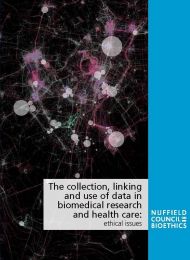The collection, linking and use of data in biomedical research and health care: ethical issues
Report
Published 03/02/2015

A trend in life sciences research is the increasing use of very large datasets by international teams of researchers studying a wide range of health conditions and diseases. In 2014, it was estimated that one in 30 of the UK population (2.2 million people) were participating in cohort studies.
Adapting to changing circumstances
A common feature of many data initiatives is uncertainty about the specific future uses of the accumulated data. UK Biobank relies on a model of broad consent and the project aims to keep participants informed about research carried out, and any results, through newsletters and their website.
UK Biobank has a published Ethics and Governance Framework (EGF), which was developed in consultation with a range of stakeholders, and which is monitored by an independent Ethics and Governance Council. This provides a good example of a participative approach to developing a data intiative, though ongoing participation in governance systems will also be important as the project evolves.
The UK10K Rare Genetic Variants in Health and Disease project operates a federated system, where different projects work together under a common EGF. This puts significant emphasis on the local principal investigators to interpret the interests and expectations of participants through consultation with participants themselves.
Both of these data initiatives foreground the role of consent and recognise the challenges of interpreting it in different and changing circumstances.
We conclude
- There should be appropriate mechanisms in place so that governance arrangements can evolve during the life of any data initiative through deliberation with participants, the public, funders and the research community in order to ensure that the interests of participants are respected over the life of the project.
- Partners in research projects should be subject to reasonable surveillance to identify inappropriate data use, and sanctions for data misuse through recognised research institutions. [Chapter 7]
International scientific collaborations
There are many benefits of international collaborations but also significant difficulties. For example, scientists in one country cannot police the activities of those in another country; there may be different laws in different countries; or uncertainty about responsibilities for data protection.
Research suggests that by 2020, 80% of all health care data will pass through a cloud computing provider. The location of data repositories or cloud computing facilities may become a concern (for example, where domestic legislation enables relatively free access by the security services or other agencies of the country in which the repositories are based).
We conclude
- Collaborators on international data research initiatives should agree an explicit ethics and governance framework, and integrate this at their local research site.
- National bodies should publish their policies on the use of cloud computing in health data settings so that data initiatives can communicate this to participants. [Chapter 7]
Participant-led research
Increasing access to digital technologies and the rise of online social networks have facilitated the formation of online communities of people engaged in health research including self experimentation, self surveillance and interpretation of genomic data.
New initiatives, such as PatientsLikeMe, have the potential to generate valuable health knowledge. However, while some projects may involve collaboration with conventional academic or commercial research systems, many do not, and consequently may be subject to varying levels of oversight. However, trying to force this research into the conventional mould may well stifle the features that could make it valuable.
We conclude
Biomedical researchers should consider how to maximise the potential of participant-led research to generate health knowledge and secure public benefits, while providing adequate protection of those involved through continuing ethical and scientific assessment. [Chapter 7]

Share